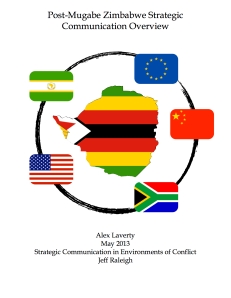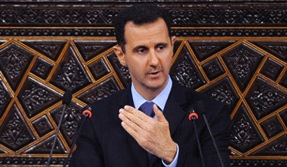If one was to look back through the Archives of this blog, one would find a post where one of the authors of this blog promised a step by step plan for how to help Zimbabwe, instead of the typically useless ‘calls for solidarity’. As the formation of this plan went along, holes began to develop and the whole idea became vastly more complicated and detailed than was originally set out to be. The African File’s now defunct sister site, The Fertile Cresent File, tore into the drafts of this project, and as time went along the situation on the ground continued to change right up to the unity government that was forced upon the MDC and Mugabe by SADC. Since then the world has watched (though less so than in 2008) as the two rivals parties try to form something resembling a functioning government. I had given up on any prescription because the situation seemed to deal more with personalities and certainly a little bit of luck, rather than any post-conflict organizational chart.
Since then, we have had a MDC Minister arrested, Morgan Tsvangirai’s wife has been killed in a traffic accident, and Mugabe has celebrated his 85th birthday.
All of which leads to this article from the Huffington Post by two ICG writers:
International Crisis Group – Sydney Masamvu and Donald Steinberg in The Huffington Post.
I have a few issues with this piece, other than the repeated calls for aid.
First deals with this paragraph:
…failure would likely lead to a new seizure of power by Mugabe and his hardline allies, even greater repression and isolation, and new hardship and abuse for the long-suffering Zimbabwean people.
I think this does quite an unjustice to Mugabe. I mean, it would be awfully hard to top the repression and isolation that has gone on in the country. I would be curious to learn where there were any areas in the lives of ordinary Zimbabweans that wasn’t ‘hard’ already. To suggest that it could be worse, is to suggest that Mugabe hasn’t been at the top of his game. I wonder how he’ll respond to that criticism.
Second, is the impression that the regional body SADC actually gives a damn about Zimbabwe through the channeling of funds:
The regional grouping of the Southern African Development Corporation (SADC), has recognized the stakes, and is putting its money where its interests are, including through new financial support from South Africa and Botswana. It is time for the broader international community to do the same.
Masamvu and Steinberg realize that these are the only countries that would even have money to contribute, yes? Angola is spending their saved up petro dollars on football stadiums for the next ACN. Mozambique is just getting its budget together after years of actually useful help from the IMF/WB. Zambia is getting poached by vulture funds. Namibia is dealing with water shortages and aid reductions. The DRC is the DRC. Madagascar is suspended, Tanzania has never made a meaningful contribution to regional development lately, and everyone else is too small to have any kind of political or economic impact. Thus to back up a claim that SADC is actually interested in solving Zimbabwe’s crisis by funding through Botswana and South Africa (who are coincidently asking us to help pay), does not really make much sense. On top of that, they include a quote by Tsvangirai saying “Don’t make us pay for working with Mugabe.” They fail to read between the lines of this quote, because what Tsvangirai really means to say is “Don’t make us pay for working with Mugabe….because you made us do it“. SADC thought they had performed their role by holding the firearm in this shot-gun marriage. With their hands now washed of Zimbabwe, they can now blame the MDC and maybe ZANU-PF if and when they screw up.
Finally, to suggest that it is the US/UK refusals to contribute humanitarian assistance as the reason for service failure in Zimbabwe is overstating the effect of Western aid. Nothing short of an invasion by medical personnel, engineers, and teachers would help begin to tackle the challenges faced by the country. To suggest that simply freeing money to support these ventures would cause anything more than a bump in PR rating for the West buys into the antiquated belief that aid can have profound effects on a country simply by giving more and more. Many books have recently been published that should diminish this belief that aid can achieve anything when funneled through sovereign service delivery agencies or that half-ass projects by the UN or the West will cause significant societal changes. People would certainly argue that something is better than nothing, but I would argue quite the opposite. Either invade Zimbabwe with services and personnel, say to the unity government “take seat, you can come back in 10 years” and then commit to a decade long project of education and service improvements, while letting the politicians map out a long-term plan of reconciliation and civic society building, OR let the Zimbabweans figure it out on their own. Anything in the middle will just prolong the final product of a safe and prosperous Zimbabwe.
 their diplomatic missions in Zimbabwe. A document based on prognostication means there are certainly gaps in understanding and predicting how humans will drive interactions. However, using a theoretical framework from the discipline of International Relations will provide guidance on constructing this forecast. Of course, not every actor is welded to a particular theory of IR, and thus below is a starting point for analysis, not the end.
their diplomatic missions in Zimbabwe. A document based on prognostication means there are certainly gaps in understanding and predicting how humans will drive interactions. However, using a theoretical framework from the discipline of International Relations will provide guidance on constructing this forecast. Of course, not every actor is welded to a particular theory of IR, and thus below is a starting point for analysis, not the end.
